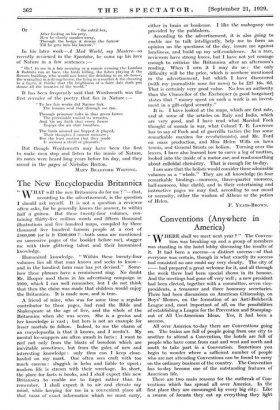The New Encyclopaedia Britannica.
" WHAT will the new Britannica do for me ? "—that, according to the advertisement, is the question I should ask myself. It is not a question a reviewer often asks, for he generally knows the answer, to within half a guinea. But these twenty-four volumes, con- taining thirty-five million words and fifteen thousand illustrations and five hundred maps, compiled by three thousand five hundred famous people at a cost of £400,000 (or is it £500,000 ?—both sums are mentioned on successive pages of the booklet before me), stagger me with their glittering talent and their humanized knowledge.
Humanized knowledge. " Within these twenty-four volumes lies all that man knows and seeks to know— and in the handiest form man has yet devised." Some- how these phrases have a reminiscent ring. No doubt Mr. Hooper used them in his advertising campaign in 1910, which I can well remember, but I do not think that then the claim was made that children would enjoy the Britannica. It is made now, and is true.
A friend of mine, who was for some time a regular contributor to these pages, had read the Bible and Shakespeare at the age of five, and the whole of the Britannica when she was seven. She is a genius and her knowledge is vast ; but hers is not an example for lesser mortals to follow. Indeed, to me the charm of an encyclopaedia is that it knows, and I needn't. My mental lee-scuppers are often awash in facts : I want to reef not only from the blasts of boredom which are' inevitable sometimes, but from the gales of new and interesting knowledge : only thus can I keep close- hauled on my mark. One often sees craft with too much canvas : sluggish in helm and liable to upset : modern life is strewn with their wreckage. In short, the place for facts is books, and I shall expect this new Britannica to enable me to forget rather than to remember. I shall expect it to air and elevate my mind, while keeping for me in a convenient place all that mass of exact information which we must carry, either in brain or bookcase. I like the mahogany one provided by the publishers.
According to the advertisement, it is also going to enable me to talk intelligently, help me to form an opinion on the questions of the day, insure me against loneliness, and build up my self-confidence. As a race, reviewers have strong knees, but I have not yet courage enough to criticize the Britannica after an afternoon's reading. When I own it I may do so : the only difficulty will be the price, which is nowhere mentioned in the advertisement, but which I have discovered (with my journalistic nose for news) to be £27 16s. 6d. That is certainly very good value. No less an authority than the Chancellor of the Exchequer (a good bargainer) states that " money spent on such a work is an invest- ment in a gilt-edged security."
It is. I have looked at the maps, which are first rate, and at some of the articles on Italy and India, which are very good, and I have read what Marshal Foch thought of morale in war, what Colonel T. E. Lawrence has to say of Foch and of guerrilla tactics (he has some remarkable maxims for revolutionists), and Mr. Ford on mass production, and Miss Helen Wills on lawn tennis, and General Smuts on holism. Turning over the leaves, I have also learned how to carve a leg of mutton, looked into the inside of a motor car, and read something about colloidal chemistry. That is enough for to-day.
I am sure that the holists would consider these admirable volumes as a " whole." They are all knowledge (in four remarkable bindings—morocco, three-quarter morocco, half-morocco, blue cloth), and in their entertaining and instructive pages we may find, according to our mood or necessity, either the wisdom of Athene or the potion of Helen.
F. YEATS-BROWN.












































 Previous page
Previous page